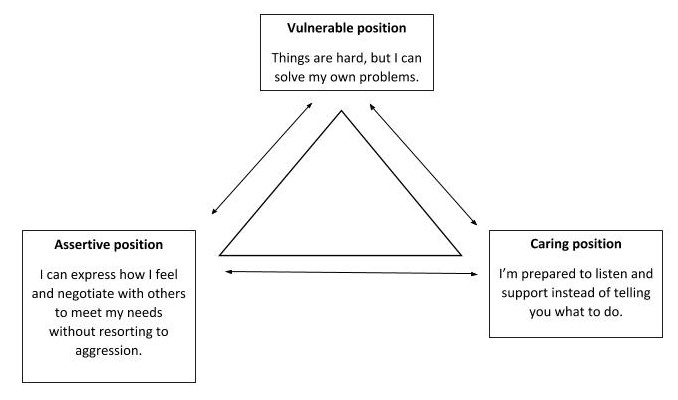
Are you finding that your interactions with others are full of drama?
It can be helpful to consider how the roles we play with others contributes to stress and unhappiness.
The drama triangle was first described by Dr. Stephen Karpman (1968) a proponent of a psychological theory called Transactional Analysis. It is a simple way of thinking about our relationships with others. The triangle shows three roles: the rescuer; the persecutor, and the victim.
The triangle is reversed, indicating the power balance, with the victim being in the “one-down” position.

The drama triangle is what happens when we don’t accept or don’t allow responsibility for feelings in ourselves or others.
- The Persecutor blames others in an aggressive or passive-aggressive fashion and doesn’t take responsibility for their own part in the drama.
- The Rescuer takes over and tries to save others from themselves. They try to avoid conflict and may take on more than they want to.
- The Victim feels overwhelmed and stuck, fearing what will happen if they act and worrying what others think of them.
The arrows indicate that roles aren’t static. Drama happens when roles are switched. For example, the Victim may swap roles with the Persecutor, attacking the Rescuer who feels resentful and upset about the lack of gratitude shown towards them (i.e. takes on a Victim role).
Alternatively, the Rescuer may get tired of their role and let their frustration with the Victim lead them to persecute them.
Tired of being trapped in the drama triangle?
If you want to improve your relationships with others, and reduce levels of stress in your life, then it may be time to step back and examine how you have been participating in the drama cycle with significant others, or co-workers.
You may find that you fall into one role more than others. If so, consider how you can act to circuit break typical patterns of interactions that are making everyone unhappy.
The alternative to the Drama Triangle has been called the Winners (or Healthy) Triangle and was first described by Acey Choy (1990). The triangle is symbolically reversed and the different roles (shown as personal standpoints) indicate very different ways of relating based on compassion, listening, and assertiveness.

Change is hard but the effort of breaking free of the drama triangle may be life changing, so it’s worth a go.
Of course, if you need help to understand and improve your interpersonal relationships the experienced psychologists at Attuned Psychology are there to help you. Feel free to contact us to make an appointment with one of our team members.
Subscribe to our newsletter Attuned Life
Would you be interested in receiving our occasional newsletter, event information and other useful tips via e-mail?

